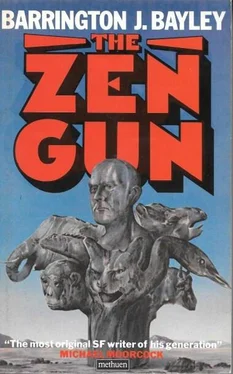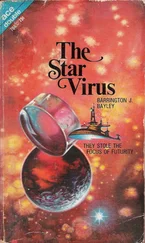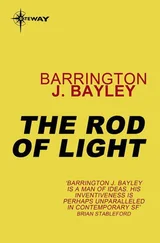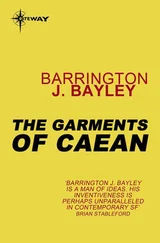“Well what about the engines?” Morgan demanded of the engineer while his master, Ragshok, fiddled with a piece of rubbery plastic on the arm of the command throne. He had discovered it gave him weird visual effects.
The engineer was a wiry Salpian. Ragshok had taken him off a passenger liner, had offered to take him home after he had got a junked engine running. But he had preferred to stay with the privateers.
He grinned, “The damage is mostly superficial, except for one thing. They need a new flux unit. Then, with a bit of repair work, she’ll go.”
He paused. “The one we have in the Dare would do the job, at a pinch.”
Ragshok started. “The Dare ?” He pulled a face. The Dare was his best and biggest ship…
But look at what he would be getting in exchange, he told himself…
He left off playing with the command throne, and looked about him, musing. He had always dreamed of some great exploit. “Do you remember Varana?” he murmured. “Not a big place. Just a little moon, really, with a littler moon in attendance. But a nice place, and we had it to ourselves for weeks… a million people under our thumbs…”
“Until we scarpered rather than face a proper fight,” Morgan said acidly. “And remember, this tub is just a weaponless hulk now.”
“But what a hulk. You could get thousands in here, armed to the teeth.”
“We don’t have thousands. We only have a couple of hundred.”
“It’s no secret where we could get more, if there’s enticement enough,” Ragshok turned to his Salpian. “How fast could she go if we installed Dare ’s flux unit?”
“As fast as she ever went—for a while. You’d have to replace it after a year or so.”
Ragshok leaned back, still thinking. The idea is ludicrous, he admitted dismally to himself. There’s nothing we can do with this thing, except strip it bare of everything valuable.
He knew why he was so reluctant to let the ship go. It was because of his notions of grandeur. To be the outlawed master of a stolen warship of the Empire!
Just then Tengu, his systems engineer—or one of them—came bursting in. The lean, dark-skinned man seemed hot and tense.
“Those stories we heard were true,” he said in a clipped, harsh accent. “They’ve got matter transmitters aboard. They use them to transfer from ship to ship.”
Ragshok stared at him. “You’re sure?”
“Chief, you can eat my brains if I’m ever wrong.”
The privateer captain turned away. His face was slack, his eyes glazed. The idea that was bubbling, fermenting, bursting within his skull was just too good…
The strident clamour that rang through the craft as it approached the edge of the planetary system ahead made Hesper Positana grit her teeth in frustration. It was the “every man for himself” call.
Sheathed in one of the forward bubbles (she was supposed to be manning a dart—a short-range missile launcher), she banged a fist angrily on her communicator and heard the voice of the captain issuing final instructions to his officers.
The ship had once been a licensed police craft and was one of the few vessels in the rebel fleet—one of the few in the whole of Escoria—actually built as a fighting vessel. They had done some fighting, but not nearly as much as they had been running, so it seemed to her, and all her gall was in her voice as she yelled, “What in space’s name is this?”
“We can’t outrun them, Hesper,” the captain’s voice came back. “Save yourself.”
“Then let’s make a fight of it!”
“It’s no good Hesper— it’s the flagship itself that’s after us .”
She swallowed. The alarm was still ringing.
Then, with a snarl and “Tcha” of annoyance, she loosed off all three remaining darts in succession and, moving lithely, snaked herself through the hatch at her back and loped down a narrow corridor to the escape station. There were several survival eggs left. Without more ado she tucked herself into one, pulled down the starting blind, and felt herself go down the chute.
On the glowing screen before her eyes she could see what was happening. The Shark —the ex-police cruiser—was by now ploughing halfway into the planetary system where they had hoped to hide, crossing the orbits of the gas giants. As the survival eggs sprayed out of the feetol field they carried its remanence; they would guide themselves as close as possible to any near inhabited planets.
The screen tracked the paths the eggs were taking. Many were making for a small planet with a reddish hue. But others, herself included, had chosen a different target: the next world inward, of which she could make out little.
Then the dot that was the Shark flared briefly: a point of light momentarily brighter by virtue of a consuming instant of nuclear fusion. A feetol shell had found its mark.
The survival egg was decelerating rapidly but it would probably take her, in the next minute or so, to the inward planet it had selected. Its inertial protection was without sophistication, and barely adequate. She was spun at she did not know what rate, at thousands of rotations per second, on a hundred different axes, as it handled and dissipated the excess inertial energy arising from a slowing down to below the speed of light and lower still, and which would otherwise have converted her to a puff of gas. Even so, she passed out several times.
A calm, confident voice sounded in her ear, designed to encourage a forward-looking attitude in the egg’s occupant. “Atmosphere. Please prepare to look out for a landing place.”
She could hear thin upper air whistling past the eggshell now. There was a blip and a radar map of the terrain below appeared on the screen before her. She squinted and tried to make it out.
She heard, with a crack, the rotor blades opening.
Pout was quivering with pleasure and excitement. He had left his following, telling them to stay in one place until he got back, and had walked two or three miles through the savannah. His people were used to him wandering off and he knew they would wait for him; they had no choice.
The boy Sinbiane had told him there was a village here. Pout had seen the flat roofs of the houses from some distance off. Now, crawling on his belly atop a grassy bank, a perfect vision awaited him.
It was dusk. The air was mild and spicy. And down the other side of the bank, scarcely more than a few yards away, he was staring straight into a girl’s bedroom.
She had her light on; all the cosy details of the room were visible through the open window with perfect clarity. The girl was sitting at a table with a mirror on it; he couldn’t make out quite what she was doing. But now she rose, and in full view of where Pout was lying, pulled off her upper garment over her head. Underneath, she was bare to the waist. Her breasts were heavy and voluptuous, and they bounced when released from the garment.
Pout was only partly human. Sexually his libido was vague. A woman, various female apes, were all capable of arousing him, but to what end was blurry to his mind. His sense of the erotic had, however, found its object.
He brought out the zen gun from where he kept it in his bib, chuckling inanely in his throat. He cradled it to his cheek, crooning.
“ I can maim and I can kill, with my zen gun .”
So ran the refrain that passed through his mind whenever he took the gun in his hand. He had learned many tricks with it by now. It did not have to kill every time it fired. Its power was variable. It could just cripple—or simply hurt.
Pout like it when it hurt.
He had set the studs for pain. He pointed the gun. He squeezed the trigger stud. He did not have to aim with any accuracy. His thoughts did the targeting; he had learned that long ago.
Читать дальше












